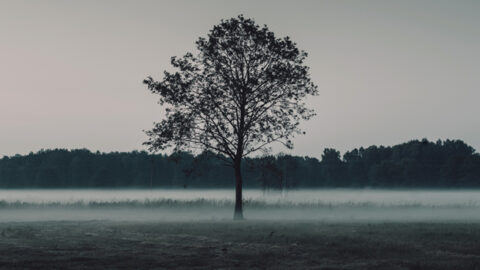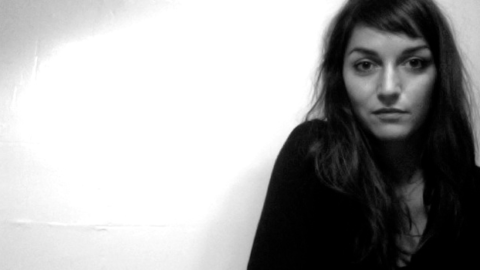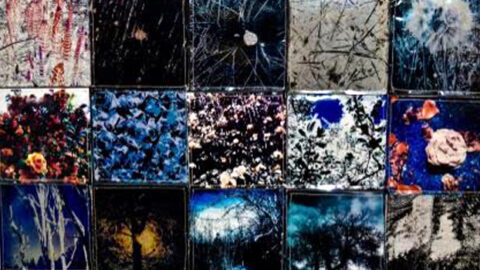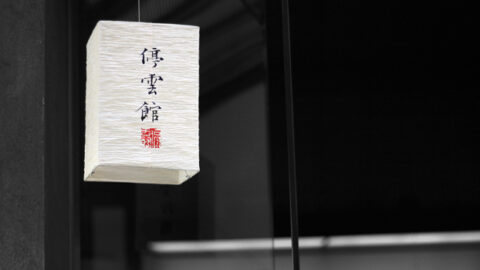Daniel Donaghy is a writer, professor, father, and husband whose poetry evokes growing up in Philadelphia, the inspiration of his chapbook “What Cement is Made of,” a finalist for this year’s Anzaldúa Poetry Prize.
Speaking As A Student: How Valuable is my Voice?
When I started writing stories, at perhaps seven or eight, I never lacked any confidence in my choice of subject matter. Comic books about superhero penguins, page-long stories about gremlins in the garden, copyright-infringing narratives about Bugs Bunny. These ideas were not ground-breaking,
Empathy: The Science-Backed Fortune Cookie
From time to time, as artists and in our various other roles, we’ve all felt as though we are suffocating: Under the weight of a deadline. Under a pile of rejection letters. Under your peers’ seemingly-impossible successes. Or simply beneath the weight of a bad day.
“empathy for cars / force of July” – An Interview with Poet Davy Knittle
By day, Davy Knittle is a PhD student at the University of Pennsylvania, and by night he’s an award-winning poet. Knittle’s interest in and love of poetry was piqued during high school, when he was taught for a year by poet Yolanda Wisher. While much of Knittle’s life is dedicated to and his writing and his studies, he also enjoys simple things,
Strangers, Stations and Surprises: How I Learned to be Inspired by New York
“You shouldn’t be reading things like that. You ought to throw that book away,” came the final words of the woman on the train station platform as I slunk, tail between my legs, between the closing doors.
Having lived in the Empire State for more than a year now, I have become used to idle small talk.
But this was not enough to prepare me for the woman on the train station platform.
The Moon, Antarctica and Other Sites of Fruitful Solitude
Modest Mouse’s album, The Moon and Antarctica, was already five years old when I first heard it—as a file shared over AOL Instant Messenger. When I downloaded the file inside my dorm room at the beginning of sophomore year of college, I didn’t know it would become the soundtrack to some of the most delicious and productive solitude of my life.
How to Defend Your MFA: The Hairdresser’s Line of Inquiry
I was having my hair cut recently in my home town in the English countryside, enjoying a break from the perpetual motion machine of New York. Not a terribly interesting thing in itself, but when you’re in the summer bridging your two-year MFA program, with your thesis relentlessly vying for your attention, any moments in which you can sit and relax are worth noting. So there I was, happily trapped at the mercy of the hairdresser, trying to look uninteresting enough to avoid conversation, when:
“So what do you do?” she asks innocently.
Anzaldúa Poetry Prize: 2015 Winner & Finalists
Spirit in the City: Lauren Nixon on Creative Places and Spiritual Practice

Lauren Nixon is a Food and Wellness Educator who guides people in cultivating spirit-filled lives through self-care practices and real, healthy food. She writes about healthy food for BlackGirlinOm. Her writing has also appeared in MindBodyGreen, Elephant Journal, Cooking Light Magazine’s Simmer, Boil Blog and others.
I spoke to Lauren during a time of exciting transition
Unleashing the Unconscious: Poetry, Place and Neuroscience in the Art of Kuma Kitsune
Above: Detail from Kitsune’s A Walk Through the Looking Glass.
Kuma Kitsune is a mixed-media artist and photographer living in Portland, OR. Her work incorporates a diversity of materials, such as fabric, projection film, tiny shreds of paper — and, in her most recent installment, other people’s poetry. More of her work can be seen here.
E. D. Watson: Your current work, A Walk Through the Looking Glass, is an assemblage of twenty-four individual pieces, titled with fragments of poetry produced by Hafiz, Ray Bradbury, Mary Oliver, Rimbaud and Lewis Carroll, which form a corresponding poem. Viewers are then invited to re-position the works and create their own poem from the new arrangement of the titles. Can you talk a little bit about how literature influences your work, and how you came to select these particular, seemingly disparate, writers?
Kuma Kitsune: I think what most influences my work is the Surrealistic concept of unleashing the unconscious.
The Book I Read Before I Was Ready: The Red Tent by Anita Diamant
When I was fifteen years old, my mother’s book club read The Red Tent by Anita Diamant. Whether she knew it or not, I was reading along with her.
In Defense of ‘A Watchman’
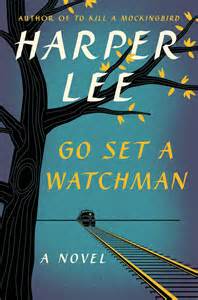 Now that the hoi polloi have had a chance to read Harper Lee’s “new” book, I don’t feel uncomfortable writing about it before most people have had a chance to make up their own minds. (Spoiler alert: those of you still on the waiting list at your local public library, I’m going to talk about the way Lee supposedly shreds the moral fiber of everyone’s favorite dad, a.k.a. Atticus Finch, like a log of string cheese. You probably already know about this though, unless you’ve just awoken from a coma. In which case: Hi. Welcome back. )
Now that the hoi polloi have had a chance to read Harper Lee’s “new” book, I don’t feel uncomfortable writing about it before most people have had a chance to make up their own minds. (Spoiler alert: those of you still on the waiting list at your local public library, I’m going to talk about the way Lee supposedly shreds the moral fiber of everyone’s favorite dad, a.k.a. Atticus Finch, like a log of string cheese. You probably already know about this though, unless you’ve just awoken from a coma. In which case: Hi. Welcome back. )
The Panic of Writing
I’m halfway through a three-week writing retreat at the foot of the Blue Ridge Mountains in Virginia, and what has occurred to me over and over is how little time I build writing into my daily life, how haphazard it is, an afterthought, something I too easily cast aside.
Bad Kids at the Milk Tea Shop: Leisure Time, Reading and Writing in Chengdu and Neijiang, China
Luis Humberto Valadez was born and raised in Chicago Heights, Illinois. He received his MFA from the Jack Kerouac School of Disembodied Poets at Naropa. His publications include the poetry collection what i’m on from the University of Arizona Press (2009) and the book/music project Valid Lush from Plumberries Press. After completing a term of service with the Peace Corps in Neijiang, Sichuan, China, he was hired by Peace Corps China as a TEFL Manager and is currently based in Chengdu. More of his work can be found at here. Valadez takes his job supporting Peace Corps teachers seriously, and also tries to fit in a literary life.
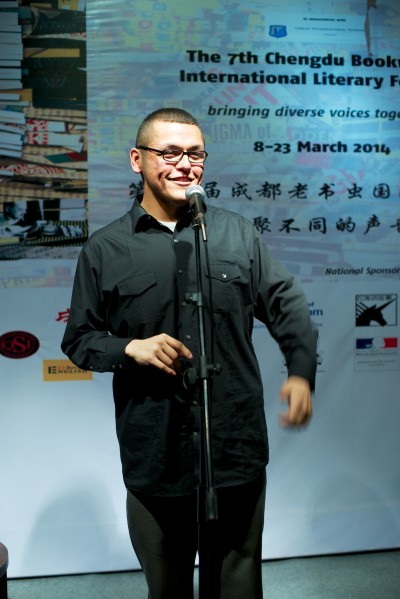
Singapore’s Literary Culture and the Power of a National Library
Image credit: Shravan Krishnan.
In a recent interview with SG Magazine, Malaysian writer and resident of Singapore, Tash Aw, criticized Singapore’s lack of literary culture. Calling out the country’s educational system, Aw says, “the whole thing about writing requires you to question stuff in general. Not necessarily political things, but from a personal point of view. It needs you to question stuff that’s going on inside yourself. Very basic things, like family. That’s not something the Singaporean educational system encourages.” Aw goes on to point out the Singaporean peoples’ general disregard for literature and self-history, their emphasis on work and social standing, as well as other cultural ideas.
In defense of his country, though, Aw offers this: “I think Singapore is very creative, with great film-makers and visual artists. Literature is the one thing that’s lagging behind. The Great Singapore Novel isn’t going to happen for a long time, because to have any novel, let alone a great one, you need to be able to draw upon reserves of experience. If you’re going to rely on that post-’65 narrative, then Singapore is a young country. Somewhere like Britain has had hundreds of years.”
The Purpose of Subversive Writing, Or, The Pastor’s Wife Has Tattoos
Subversion has been on my mind for at least six months now. I like the way the word sounds when I say it out loud. It moves toward the front of my mouth, over my tongue and lips, rolls back toward my throat, and finally lands on the tip of my tongue at the end of the last syllable.
As the word “subversion” rolls around the mouth, it’s also a word, in action, that deconstructs and challenges. It’s a hard-working word, frightening to those who hold power. The word comes from the Latin subertere, meaning “to overthrow.” I love the definition of the word: “An attempt to transform established social order and its structures of power, authority, and hierarchy.”
Literary Treasure Hunting in Cape Town
Between 2006 and 2012, I lived in and studied in Cape Town, South Africa. During my time there, I discovered works I never would have found in the States (where I’m from). I could have wept with joy when I occasionally, unexpectedly, stumbled upon great books in junk shops with low-low prices. It was like unearthing a treasure. I spent uncountable hours reading in the African sun—on a quiet corner of campus, on a beach off the Atlantic Ocean, under any tree I could find.
Catching #FerranteFever
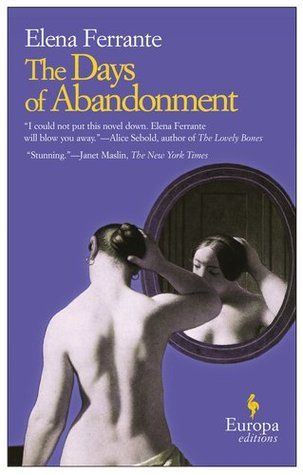 If Italian author Elena Ferrante knows about #FerranteFever, the social media hashtag used by fans to describe their obsession with her books, I’d be willing to bet the phenomenon makes her uncomfortable. Possibly, she’s rolled her eyes about it. That’s because, in this age of selfies and shameless self-promotion, Ferrante is something of an iconoclast, eschewing all public appearances and social media, granting few interviews, and fiercely guarding her true identity (Elena Ferrante is a pen name).
If Italian author Elena Ferrante knows about #FerranteFever, the social media hashtag used by fans to describe their obsession with her books, I’d be willing to bet the phenomenon makes her uncomfortable. Possibly, she’s rolled her eyes about it. That’s because, in this age of selfies and shameless self-promotion, Ferrante is something of an iconoclast, eschewing all public appearances and social media, granting few interviews, and fiercely guarding her true identity (Elena Ferrante is a pen name).
In a rare interview with the author in the spring 2015 issue of the Paris Review, Ferrante declares herself “still very much interested in testifying against the self-promotion obsessively imposed by the media. This demand for self-promotion diminishes the actual work of art, whatever that art may be, and it has become universal.” She then goes on to explain the creative space that opened up for her when she realized that her anonymity would be protected by her publishers. “[It] made me see something new about writing,” she says. “I felt as though I had released the words from myself.”
Getting Lost
I’ve been getting lost lately. I’m forty now; getting mixed up and turned around isn’t a problem I recall having as a twenty-something. It began one day in my late thirties when I went for a walk by myself in the subdivision where my brother lives with his family. Only the day before, I’d gone for a run with my seven-year-old niece, who rode her bike. She suggested we head to the back side of the subdivision, where I’d never been before. She was confident we wouldn’t get lost. I followed her, and as she promised, we made it safely back without incident. I thought I’d paid attention to the path she took.
Behind the Tweet: Memorable moments from AWP 15
I don’t tweet a lot. I hear Facebook is so yesterday, and I only look at Instagram while I’m in the bathroom—but Twitter is supposed to be where it’s at. As a writer, I find it hard to narrow my thoughts down to a mere 140 characters, including hashtags. But at AWP 15 in Minneapolis, I tried to get in on the fun and hit the highlights of my time there.
April 9: “Don’t let anyone consider your poems confessionalist. That’s crap.” –Jan Beatty, #AWP15
I went to “The Poem as a Bodily Thing” panel, where I heard some wonderful thoughts on poems as a, well, bodily thing. This quote by Jan Beatty (who’ve I’ve admired for a long time) definitely struck me. Her point was about sexism and how no one would ever consider a man to be a confessionalist poet. I’m a woman, I’m a poet, and I’ve most-definitely been labeled as confessionalist. Jan is a wise woman.
Apr 9: “It’s time to stop worrying about if people like you. You are grown-ass adults. Time to pack that away.” -@ElissaSchappell Amen! #AWP15
AWP 15: Something for Everyone — And Then Some
I’d been told many times how large AWP would be. Statistics were bandied about (550 panels and readings! 2000 presenters! Over 700 journals!) until the convention became something beyond comprehension. I worked on my schedule for three days before realizing how redundant it was to plan for something so full of activity and opportunity. Go with the flow, the behemoth seemed to demand.
The first of many panels that I saw was the enticingly titled “Sympathy for the Devil: Writing ‘Unlikable’ Characters.” As the name suggests, the panelists were dedicated to explaining why a character that you want to hang out with is not necessarily better than a character you would never want near your children. References as diverse as Humbert Humbert, Bullet in the Brain and the Devil, were supplemented with the panelists’ own readings about white supremacists, violent teenagers and puppy-drowners to create an enthralling mix of discomfort and fascination. Needless to say, it was not a reading for the faint of heart.






